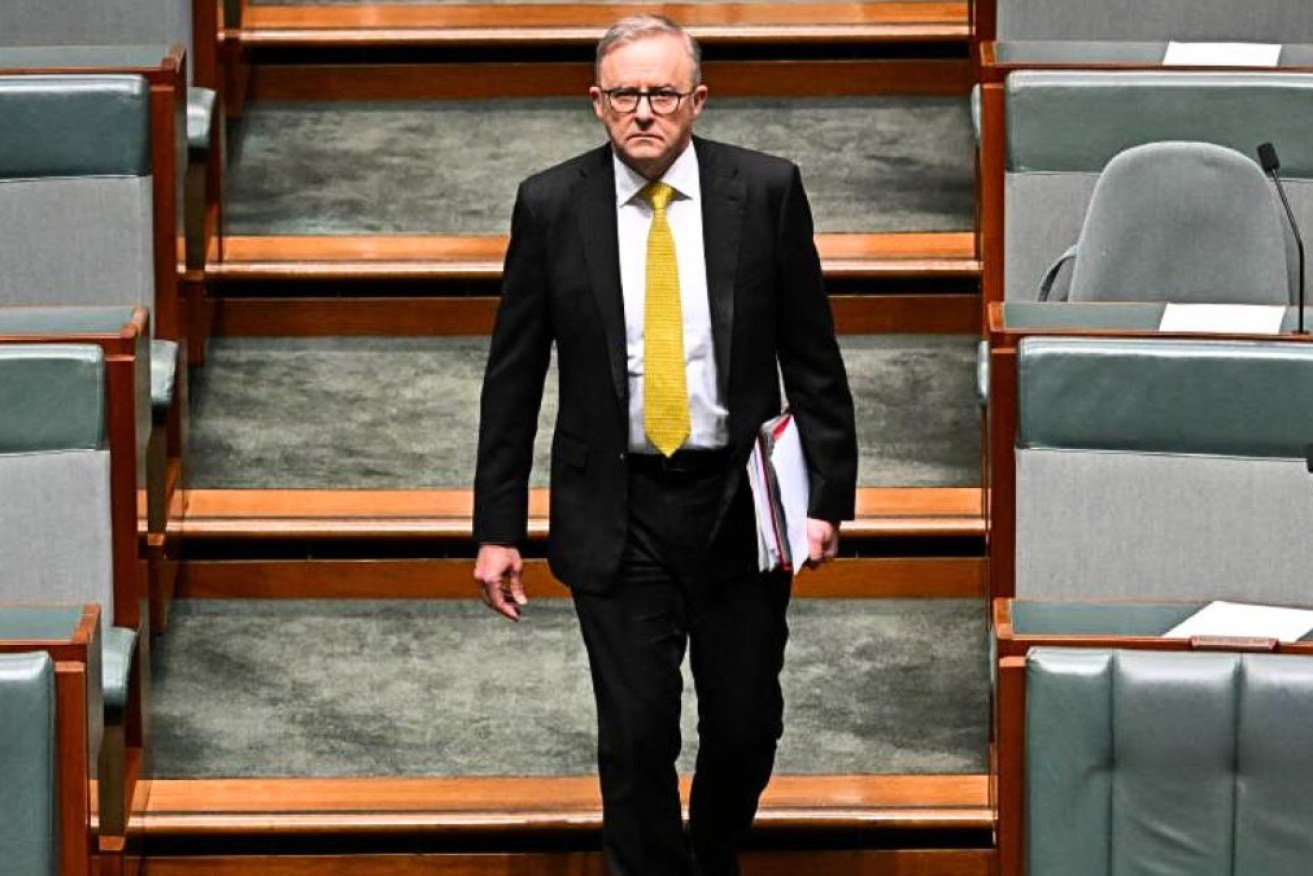Paul Bongiorno: Albanese has 18 months to overcome political PTSD


PM Anthony Albanese and his team must react faster and more decisively to reagin momentum, Paul Bongiorno writes. Photo: AAP
The Albanese government seems to be suffering from a political post-traumatic stress disorder.
They inevitably try to mask it but every prime minister flies by the seat of their pants as unforeseen or unwelcome events buffet them and their government – but it is how they respond that either inspires confidence or saps it in voters’ minds.
Anthony Albanese makes a virtue of not breaking his election promises and leading a considered, serious government that does its homework before implementing action to clean up the many messes left to it to clean up.
There is plenty of evidence to show that this indeed is what we have seen over the past 18 months.
In economic policy, for example, the Australian government has retained its AAA credit rating, inflation – while persistent – has peaked, and there is $23 billion worth of cost-of-living relief which, among other things, has restrained increases in the still-too-high electricity sector.
Past constrains future
One long-term associate of the Prime Minister is of the view that Albanese in particular and the government more generally is suffering from a sort of political post traumatic stress disorder (PTSD) following Labor defeats going all the way back to 2001 on border security, taxation reform and climate policy.
This imposes a mighty constraint on how the government reacts to unfolding crises and challenges.
There is a lament in the corridors of Canberra that all Labor is doing is implementing – albeit mostly in a more efficient way – Coalition tax, defence and immigration policy.
A case in point is the response to the High Court’s ruling indefinite immigration detention for those with no prospect of resettlement elsewhere is unconstitutional.
It took almost a week to come up publicly with a response which, according to some sources, was not all that cabinet had agreed to: There were tougher conditions to bridging visas for the 83 immediately released but no word of criminalising any breach of these conditions.
If cabinet had agreed to this unprecedented measure it took until Thursday for it to emerge after Peter Dutton attacked the government for being weak on community protection in a blistering attack in Parliament on Wednesday.
He demanded that the detainees, who he wrongly claimed were all “hard-core criminals” – murderers, sex offenders and pedophiles – should, in defiance of the High Court, be immediately returned to detention.
Later for good measure he even claimed they were security risks, despite being informed none in the cohort had been assessed that way by ASIO.
That attack was an unconscionable overreach and a deliberate distortion of what options were legally available but, as in the Voice referendum, Dutton was much quicker off the mark and unscrupulous in his leveraging of exaggerated fear and loathing.
Capitulation
Instead of calling out the Coalition leader for his false claims the government, as the Greens leader Adam Bandt rightly described it, capitulated.
Dutton’s political victory was trumpeted all over the front page of the national daily, The Australian, his disgraceful claims and undermining of the High Court went unchallenged.
A government source says cabinet was paranoid it would be blamed if one of the released detainees did “something horrible”.
All they wanted was to get the issue out of the headlines as quickly as possible. They didn’t want another ‘Tampa affair’, where then PM John Howard leveraged pernicious xenophobia against Labor.
By now the government must know that in Dutton they have an opponent straight out of the Trump post-truth political playbook and yet the way in which it also handled the sonar attack by a Chinese warship on one of our frigates suggests they are slow learners.
The timing of the announcement of the attack and the serious condemnation of China for it by Acting Prime Minister Richard Marles on Saturday smacked of a five-day cover up to shield Albanese from it becoming a public issue while he was attending the APEC summit in San Francisco with President Xi Jinping.
Private practice
Our ambassador in Washington, former prime minister Kevin Rudd, in an interview on Monday morning tried to help out.
Rudd’s explanation that private conversations between world leaders are as a rule confidential was plausible, especially as the government had not let the episode go without protest – an argument Albanese made later in the day.
Still the impression lingers that the attack was not raised with the Chinese president and the Opposition continues to infer the Prime Minister had somehow sold out the nation.
Not that the China hawks in the Coalition are in any strong position to lecture Albanese on how to deal with the Asian giant which also happens to be our biggest trading partner.
The outspoken shadow minister Andrew Hastie never resiles from warning what a strategic threat China is and demanding Albanese do more about it – despite his side, for nearly a decade spending billions on defence procurement disasters like submarines, jet fighters and frigates that left the nation as exposed as it has ever been.
The government has 18 months to sharpen its game and get over Labor’s earlier political traumas.
Paul Bongiorno AM is a veteran of the Canberra Press Gallery, with more than 40 years’ experience covering Australian politics








